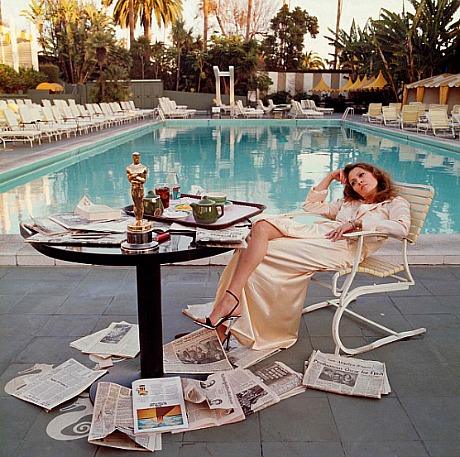Today is Faye Dunaway‘s birthday. This might sound like a rough draft for an obit, but it’s not meant to. I’m just paying respect to a legendary actress who has long had a rep of being an extra-gusto type — steely, gifted, high-strung, large of spirit, whipsmart, occasionally tempestuous, always out for the big game.
In the public mind, naturally, Dunaway will always be the sum total of her finest performances — Diana Christensen in Network (for which she won a Best Actress Oscar 40 years ago), Bonnie Parker in Bonnie and Clyde, Evelyn Mulwray in Chinatown, Kathy Hale in Three Days of the Condor and, somewhat painfully, Joan Crawford in Mommie Dearest. For that great Frank Perry film (which I’ve seen four or five times, and fell for the first time I saw it at the Manhattan headquarters of Paramount Pictures in August of ’81) more or less ended her 14-year hot streak, which had begun in ’67.

Dunaway had just turned 40 that year and was, in my mind, at the peak of her game. I couldn’t have foreseen any career problems at that point — she had just given one of the greatest guns-blazing performances ever — but Mommie Dearest, odd as it now sounds, was the end of the big-time.
Well, not the “end” but why is it that I can’t think of any serious stand-out performances after Mommie Dearest except for Barfly? For her portrayal of Joan Crawford was so processed and celebrated as a kind of camp classic, things slowed down for her due to typecasting. Or so Dunaway came to believe.
“After Mommie Dearest, my own personality and the memory of all my other roles got lost along the way in the mind of the public and in the mind of many in Hollywood,” Dunaway said in her 1995 ghost-written memoir. “It was a performance. That’s all that it was. For better or worse, the roles we play become a part of our persona, and the actress and the woman are identified with that persona. People thought of me as being like her. And that was the unfortunate reality for me about this project.
It feels strange to think of Dunaway’s peak period as having ended 35 years ago, more or less, but that’s what the calendar says.
Pretty much everything she did between ’67 and ’81 was great except for The Thomas Crown Affair (weak except for that sexy chess-playing scene between herself and Steve McQueen), The Towering Inferno, Eyes of Laura Mars and The Champ. I loved her in The Arrangement, Little Big Man, Puzzle of a Downfall Child, The Three Musketeers and the not-as-good sequel, The Four Musketeers, in which she was beheaded.
